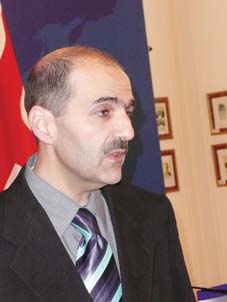Georgian delegation off to Geneva talks
By Temuri Kiguradze
Wednesday, July 1

“Our proposals are real and realisable but their implementation depends on how constructive the other sides at the meeting will be,” stated Georgian Deputy Foreign Minister Alexander Nalbandov at a June 29 briefing in Tbilisi. “We welcome the fact that the scheduled meeting will not be thwarted and will take place on 1 July as planned. Unlike Moscow and the proxy regimes, we have always shown a constructive attitude and we call on the other sides to do the same,” added the Deputy Minister.
The Geneva talks were established after the August Russian-Georgian war to fulfil one of the conditions of the EU-mediated ceasefire agreement signed by the parties to the conflict. They involve representatives of Georgia, Russia, the separatist regions of Abkhazia and South Ossetia and mediators from international organisations. The only result of the previous five meetings has been the creation of an incident prevention mechanism in South Ossetia that should provide the basis for negotiations between Georgia and the de facto South Ossetian authorities which will resolve and prevent problems in the conflict zone. However only one such meeting has been conducted, due to the refusal of the South Ossetian side to continue the talks in the existing format.
The Kremlin has given its own view on the continuation of the Geneva process in a special statement published on Monday on the official Russian Foreign Ministry webpage. “Obviously the new situation obtaining in Transcaucasia requires serious rethinking, inter alia, with respect to the format and prospects of the Geneva discussions. We mean to raise all the accumulated questions with the July round participants. In these conditions the need for the conclusion of binding documents on the non-use of force between Georgia, the Republic of Abkhazia and the Republic of South Ossetia is acquiring even greater significance. The international community must have firm guarantees that the terrible tragedy of last August does not recur in the Transcaucasian region,” says the statement.
This Kremlin position is supported by the South Ossetian proxy regime, which has stated that representatives of the Tskhinvali ‘Government’ will also demand that a document on “non-aggression” is signed. “The main question for us is the question of security; we need guarantees that Georgia will not undertake another aggression against us. I want to note that the document on non-aggression that was mentioned by the ceasefire agreement has still not been signed. We have to consider the threats created by the remilitarisation of Georgia and the revenge-seeking plans of the Georgian authorities,” stated Boris Chochiev, the representative of de facto South Ossetian leader Eduard Kokoity.
Commenting on the Geneva meeting, Georgian political analyst Soso Tsiskarishvili noted that “it’s wrong” to expect any kind of concrete result from the meeting because “Russia is absolutely not interested” in any positive move in the South Caucasus conflicts. “Russia uses this meeting to drag out time, and of course it will use the futility of the Geneva process to put more pressure on during the future Obama-Medvedev meeting,” said the expert.
Tsiskarishvili called the Russian proposal for a “non-aggression” agreement between Georgia and its breakaway regions “absurd.” “The only aggressor country in the South Caucasus is Russia, its status as an occupier is confirmed by the international community, so if a non-aggression agreement should be signed, it should be between Georgia and Russia to prevent another intervention in Georgia,” concluded Tsiskarishvili.
